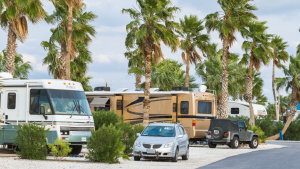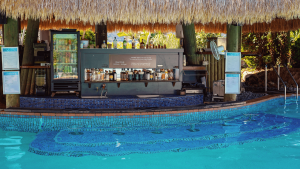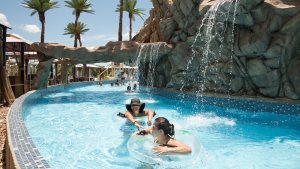The idea of living in an RV park year-round has gained traction in recent years, thanks to the flexibility and freedom it offers.
Whether you’re considering this lifestyle for financial reasons or simply for the love of the open road, the question remains: Can you live in an RV park year round?
Can You Live in an RV Park All Year Long?
Yes, you can live in an RV park all year long, but there are several factors to consider, such as the type of RV park, its amenities, and the rules and regulations that govern extended stays.
Types of RV Parks: Seasonal vs. Year-Round
RV parks come in various forms, including seasonal and year-round parks. Seasonal RV parks are typically open for a specific period, while year-round campgrounds are open 365 days a year, many of which offer amenities suitable for long-term stays.
Legal Aspects of Year-Round RV Living
Living in an RV park year-round is generally legal, but it’s important to understand the park’s rules and any local ordinances that may apply. Some parks have a maximum stay limit, while others offer extended stay or monthly RV park rates specifically designed for full-time RV living. Always read the fine print and consult the park’s management to ensure you comply with all regulations.
Amenities and Facilities
The amenities offered by RV parks can vary widely. While some parks provide basic hookups for electricity, water, and sewer, others offer a range of amenities like a fitness center, pool, and laundry facilities. These amenities can significantly affect your comfort and convenience when living in an RV full-time.
Cost Considerations
The cost of living in an RV park year-round can vary based on location, amenities, the season, etc. Some parks offer discounts, especially during the off-season, which can benefit those looking to save money. It’s advisable to compare monthly RV rates at different parks and factor in additional costs like RV insurance, propane, mail forwarding services, etc.
Finding Long-Term RV Parks
Full-time RV living starts with one fundamental question: Where can you park your RV for an extended period? The answer lies in finding long-term RV parks that align with your lifestyle needs.
This section will guide you through the various methods and resources available for locating extended-stay RV parks.
Search Engines

The internet is the first stop for many when it comes to finding long-term RV parks. Search engines offer a broad range of listings, but using specific search terms to narrow down your options is key.
- Keywords: Use specific keywords like “long-term RV parks,” “extended stay RV parks,” and “year-round RV parks” to get the most relevant results.
- Location-Specific Searches: Adding a location to your search can help you find parks in your desired area. For example, “long-term RV parks in Florida” or “year-round RV parks in Texas.”
Websites & Apps

Several dedicated websites and apps serve as comprehensive RV park directories. These platforms offer more than just listings; they provide reviews, photos, and detailed information on amenities and rates.
- Campendium: Known for its user reviews and wide range of listings, Campendium is a reliable source for finding extended-stay RV parks.
- AllStays: This platform offers an exhaustive RV park directory, complete with information on amenities, availability, and rates.
- KOA (Kampgrounds of America): A trusted name in the RV industry, KOA offers long-term stays at many of its parks.
Ask Fellow RVers
Sometimes, the best information comes from those who have lived the experience.
- RV Forums: Online communities such as RV forums are excellent platforms for asking questions and sharing experiences about long-term RV parks.
- Social Media Groups: Platforms like Facebook have groups dedicated to RV living where members share recommendations and reviews.
- Word of Mouth: Don’t underestimate the value of good old-fashioned word-of-mouth recommendations. If you meet fellow RVers on the road, ask them about their experiences with long-term RV parks.
- RV Shows and Events: These gatherings are not just for showing off the latest recreational vehicles. There are also networking opportunities where you can meet industry experts and seasoned RVers who can guide you in finding long-term RV parks.
Check out our guide to finding the best long-term RV parks near you for more information and tips!
Benefits of Staying in an RV Park Year Round

Choosing to live in an RV park year-round comes with a unique set of advantages. From potential cost savings to the availability of amenities and the freedom to live life on your terms, the benefits are numerous.
Potential Cost Savings: Is It Cheaper to Live in an RV Park?
One of the most compelling reasons people choose full-time RV living is the potential for cost savings. While the initial investment in a recreational vehicle can be significant, the ongoing expenses can be more manageable than traditional housing.
- Monthly RV Rates: Many RV parks offer discounted rates for extended stays. These monthly RV rates can sometimes be significantly lower than renting an apartment or paying a mortgage.
- Utility Costs: Living in an RV can also reduce utility bills. Many RV parks include water, sewer, and sometimes even electricity in their rates.
- No Property Taxes: Unlike homeownership, living in an RV frees you from property taxes, which can add up to substantial savings over time.
Amenities and Facilities
RV parks are not just parking lots for your vehicle; they often come equipped with various amenities that can enhance your living experience.
- Basic Hookups: Almost all long-term RV parks provide essential hookups for electricity, water, and sewer.
- Additional Amenities: Many parks go beyond the basics, offering facilities like laundry rooms, fitness centers, pools, playgrounds, and communal areas for socializing.
- Security: Some RV parks offer gated access and security patrols, providing an added layer of safety.
- Mail Services: For those concerned about receiving mail while on the road, some RV parks offer mail forwarding services.
Flexibility and Freedom
Living in an RV park year-round doesn’t mean you’re tied to one spot. One of this lifestyle’s most appealing aspects is its flexibility and freedom. If you get tired of your current location, moving to a new RV park is relatively simple.
Community
RV parks often have a sense of community that’s hard to find in other living situations. Whether it’s communal BBQs or group outings, social opportunities are abundant.
Potential Drawbacks of Full-Time RV Park Living

While the allure of full-time RV living is undeniable, it’s also important to consider the potential drawbacks.
From limitations and restrictions to safety concerns and strict park rules, understanding these challenges can help you make a more informed decision about embracing the RV lifestyle.
Limitations and Restrictions
Living in an RV park year-round comes with limitations that differ from traditional housing options.
- Space Constraints: One of the most obvious limitations is the limited living space. While modern recreational vehicles are well-designed, they can’t match the square footage of a traditional home. Outside space is also limited.
- Utility Limitations: While most RV parks offer basic hookups like electricity, water, and sewer, you may encounter limitations in terms of power supply and water pressure.
- Pet Policies: If you’re an animal lover, you’ll need to check the RV park’s pet policies, as some parks restrict the number or types of pets allowed.
- Visitor Policies: Some RV parks have strict guidelines about visitors, including how long they can stay and where they can park.
Safety Concerns
No matter where you live, safety is a concern, and RV parks are no exception.
- Weather Risks: RVs are not as sturdy as traditional homes when it comes to extreme weather conditions. Make sure to check the weather patterns in the area where you plan to stay.
- Fire Safety: Due to the close proximity of RVs in a park, fire safety is a concern. Always adhere to fire safety guidelines provided by the RV park.
- Security Measures: Let’s be honest, not much is stopping someone from breaking into an RV or stealing valuable equipment (propane tank, etc.). And with strangers continually cycling in and out and a lack of gated access or security patrols at most parks, security is a concern. But there are a few tips to help improve the security of your RV.

Strict Park Rules (Like HOA Rules on Steroids)
If you’ve ever lived in a community with a homeowners association (HOA), you know how strict rules can be. Some RV parks take this to another level.
- Quiet Hours: Many RV parks enforce quiet hours, which can be more restrictive than you might be used to in a residential neighborhood.
- Appearance Standards: Some parks have guidelines about the appearance of your RV and outdoor space, requiring regular maintenance and cleanliness.
- Activity Restrictions: Activities that you might take for granted in a traditional home, like setting up a grill or hanging laundry outside, may be restricted in some RV parks.
Tips for Making Stationary RV Life Work
Living in an RV park year-round is not just about parking your vehicle and calling it home; it’s about optimizing your space and lifestyle for long-term comfort and enjoyment. Here are some practical tips to make stationary RV life work for you.
1. Create an Outdoor Living Space
Transforming the area outside your RV into a functional living space can significantly enhance your quality of life.
- Patio: Spruce up the patio area by installing removable patio tiles or a patio rug. It provides a clean, level surface for outdoor activities and can add a touch of homeyness.
- Lighting: Proper lighting can make a world of difference. Solar-powered lights are an eco-friendly option that doesn’t consume your RV’s power.
- Furniture: Invest in comfortable, weather-resistant outdoor furniture. Foldable or stackable options can save space when not in use.
- Fencing: Putting up a fence outside your camper is especially helpful if you have pets or little kids.
2. Maximize Storage Inside
Space is almost always a concern in any RV, so effective storage solutions are key.
- Containers: Use clear storage containers to keep items organized and easily accessible. Label them for extra efficiency.
- Vertical Space: Utilize the vertical space in your RV with hanging organizers or magnetic strips for kitchen utensils.
- Under-the-Bed Storage: Many RVs have storage space under the bed. Use it for items you don’t need daily access to.
3. Focus on Collecting Experiences Over Things
The limited space in an RV naturally limits the number of possessions you can have.
- Digital Memories: Take photos and keep digital journals to capture memories without taking up physical space.
- Local Experiences: Use your stationary location as a base to explore local attractions and activities.
- Social Connections: The RV community is generally friendly and welcoming. Take the time to build relationships that will enrich your life.
4. Inspect RV Regularly
Regular inspections are essential for the longevity of your RV.
- Slides: Check the mechanisms of your slide-outs for any signs of wear or needed lubrication.
- Tires: Regularly inspect tire pressure and look for signs of wear or damage.
- General Maintenance: Keep an eye on essential systems like plumbing and electrical. Address issues promptly to prevent larger problems.
5. Safety
Safety should be a priority in any living situation.
- Locks: Always lock your doors and windows while away from your RV or sleeping.
- Security System: Equip your RV with a security system that includes alarms, motion sensors, and cameras.
- Neighbors: Get to know your neighbors. A community watch approach can add an extra layer of security.
6. Ideal Amenities for Full-Timers
When choosing an RV park for long-term living, consider the amenities that will make life easier.
- Laundry: On-site laundry facilities can save you time and trips to a laundromat.
- Mail Service: Some RV parks offer mail service, which is particularly useful for those who don’t have a permanent address elsewhere.
- Pet Area: If you have pets, look for parks with designated pet areas or dog parks.
Popular Year-Round RV Parks
Here are five popular year-round campground examples where you could park your RV to live.
*Prices below are subject to change. Contact the property for up-to-date pricing and long-term stay information
Hidden Cove RV Park

Park Information
350 County Road 2564
Wedowee, Alabama
(334) 863-0846
Website
Hidden Cove RV Park offers yearly leases for $4000 if paid in full, upfront, or $4100 if $2100 paid upfront and $2000 paid within the last ten days of the sixth month.
Zion River Resort

Park Information
551 E State Route 9
Virgin, UT 84779
(888) 822-8594
Website
Zion River Resort RV Park & Campground has various site offerings, from back-in to premium pull-through, and various rate options, including monthly rates for long-term guests.
Vista Del Sol RV Resort

Park Information
3249 Felipe Drive
Bullhead City, AZ 86442
(928) 754-0182
Website
Vista Del Sol RV Resort in Arizona has weekly, monthly, or quarterly rates for their RV lots, with a few lots for sale, which is perfect for those who want to own a lot to live on. Keep in mind this is a 55+ community, and they have certain restrictions on the type of RV they allow.
Austin Lone Star RV Resort

Park Information
7009 S IH 35 Frontage Rd
Austin, TX 78744
(512) 444-6322
Website
Austin Lone Star RV Resort is a Sun RV Communities property that is open year-round. They have annual sites with monthly rates, guaranteeing you a spot throughout the year.
Whispering Palms Resort

Park Information
10305 US Hwy 1
Sebastian, FL 32958
(800) 414-0814
Website
Whispering Palms Resort offers short-term and long-term living accommodations for RVers. For those looking to park long-term, they have annual and bi-annual rates available.
Is Year-Round RV Park Living Right for You?
As we’ve learned above, living in an RV park year-round is a significant lifestyle choice with its own advantages and challenges.
While the freedom, cost-effectiveness, and close-knit community can be incredibly rewarding, there are also limitations and responsibilities to consider. Here are some factors to evaluate when determining if this lifestyle is the right fit for you.
Assess Your Lifestyle Needs and Preferences
Before making the leap into full-time RV living, you should assess your lifestyle needs.
- Space Requirements: Are you comfortable living in a smaller space, or do you require room to spread out?
- Social Interaction: Do you enjoy being part of a close-knit community, or do you prefer more privacy and independence?
- Work Situation: If you work remotely, does the RV park have reliable internet? If you work in a physical location, how far is the commute?
Financial Considerations
Living in an RV park can be cost-effective, but it can cost considerably more if you’re not careful.
- Monthly Rates: Research the monthly rates of RV parks you’re interested in. Some offer discounted rates for extended stays.
- Utilities: While some utilities may be included in your monthly rate, others, like propane for heating, might be additional costs.
- Maintenance: RVs require regular maintenance, which can add up over time.
Legal and Logistical Factors
There are also legal and logistical considerations to take into account.
- Residency Laws: Some states may have specific laws about how long you can reside in an RV park. Make sure you’re in compliance.
- Insurance: You may need a specialized type of insurance for full-time RV living. Research your options and costs.
- Mail and Legal Documents: Consider how you’ll handle mail and legal documents. Some RV parks offer mail services, or you may need to use a mail forwarding service.
Health and Medical Needs
Your health and medical needs are another important consideration.
- Healthcare Access: Is there easy access to healthcare facilities and services?
- Prescriptions: If you take prescription medications, is there a nearby pharmacy?
- Fitness: If you have a fitness routine, does the RV park have facilities, or will you need to find a local gym?
Family Considerations
If you have a family, their needs and preferences also play a role in your decision.
- Schooling: If you have school-aged children, what are your schooling options?
- Pets: If you have pets, does the RV park have pet-friendly amenities and policies?
Evaluating these factors thoroughly can help you make an informed decision about whether year-round RV park living aligns with your lifestyle, needs, and long-term goals.
FAQs
What Is a Long-Term RV Park?
A long-term RV park is a facility designed to accommodate RVs for extended periods, typically ranging from a month to a year or more. Monthly rates are generally offered and are usually more cost-effective compared to daily or weekly rates.
Can You Stay Year-Round at Any RV Park?
The ability to stay year-round at an RV park varies by location and the specific policies of the park. While some RV parks are open year-round and allow for long-term stays, others may be seasonal and close during certain months. Additionally, some RV parks have a maximum stay policy, limiting how long you can reside there.
Tip: Always check the rules and policies of the specific RV park you’re interested in to determine if year-round living is an option.
How Long Can You Stay in Most RV Parks?
The length of time you can stay in an RV park depends on the park’s policies. Some parks may have a maximum stay limit, with 14 days being a common threshold, while others allow visitors to stay for months or even years.
Where Else Can I Park My RV to Live?
If a long-term RV park doesn’t suit your needs, there are other options for parking your RV to live full-time:
- Boondocking: This refers to camping in your RV without hookups, often in remote areas. Keep in mind that boondocking for extended periods may require you to be self-sufficient in terms of electricity, water, and waste management.
- Private Land: Whether it’s yours or you have the landowner’s permission, you may be able to park your RV on private land, for example, a backyard. Make sure to check local laws to see if it’s legal to live in a camper on it.
- Campgrounds: Some campgrounds offer extended stay options, although amenities may be more limited compared to an RV park.
- Mobile Home Communities: Some mobile home communities allow RVs and offer similar amenities to long-term RV parks.
- Marinas: Some marinas allow RV parking and offer amenities like hookups and laundry facilities.
Check out our guide on where to park an RV long-term to live for more ideas.







Write a comment